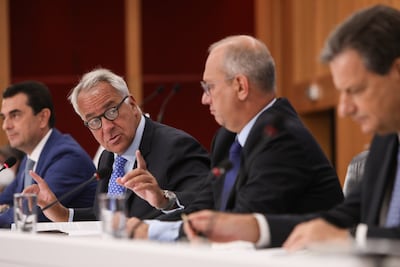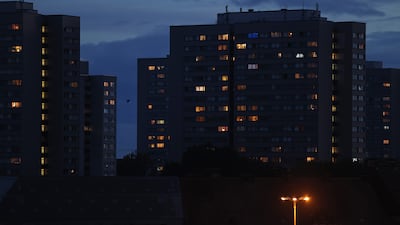EU energy ministers are meeting on Friday in Brussels to discuss their level of preparedness for the coming winter and emergency measures to mitigate high energy prices.
One topic that has been the subject of heated debate is how to reduce energy consumption. Among five proposals tabled earlier this week, European Commission president Ursula Von Der Leyen suggested a mandatory target for reducing electricity use at peak hours.
However, opinions differ within the EU and discussions are expected to be tough. A senior EU official said on Thursday that a “frank exchange of views among ministers” is to be expected.
“It is extremely important that we show unity,” they said.
While some countries have already pushed public buildings, businesses and homes to limit their use of air conditioners, heaters and lights, others, such as Poland, have opposed such measures.
Polish media quoted the country’s Climate Minister Anna Moskwa as saying on Wednesday that: “I understand that the president of the European Commission would like us to save energy and may appeal … but she has no authority to force any country to do so.”
“The European Union is trying to give itself authority that does not exist,” she said.
In July, the European Commission asked EU countries to reduce their consumption by 15 per cent by March using methods of their choice.
The senior EU official said that it remained unlikely that the measures would become mandatory in the near future. This would entail that at least five member states table a request that gas savings become compulsory.
As the debate rages on, The National breaks down the main measures taken by European countries so far to limit their electricity consumption.
Portugal
Portugal became the latest EU country on Thursday to approve an energy-saving plan through to the end of 2023. Hydroelectric power generation in Portugal dropped by 46 per cent this year amid a severe drought, Ms van der Leyen said on Wednesday.
The plan includes mandatory measures for the country's central administration and recommendations for municipalities and companies.
They range from turning off indoor and outdoor lighting in public spaces, shopping centres and shops during the hours they are closed to reducing decorative lighting during holiday seasons and after midnight to taking more advantage of natural daylight.
There will also be temperature limits for indoor air-conditioning and heating.
Greece
The Greek government announced punitive measures this week against state entities that fail to enforce its power-saving plan announced in June.
Government buildings were asked to cut their use of air conditioning and heating, as well as install windows and turn off computers after working hours to slash energy consumption by 10 per cent in the short term.
So far, only 221 out of 2,495 state entities have started complying the plan by appointing an employee to oversee it, Interior Minister Makis Voridis said on Wednesday.
Those who fail to comply will face a hiring freeze, said Mr Voridis. They could also lose funding that would help them to cover their energy bills, which came in at about €700 million ($693 million) last year, said Deputy Finance Minister Thodoros Skylakakis.
Energy Minister Kostas Skrekas said Greece would soon announce financial incentives for households and, possibly, businesses to cut their power consumption.

Germany
Germany has committed to reducing its gas consumption by 20 per cent, a necessary figure to avoid rationing this winter, its top network regulator told the Financial Times last month.
More than half of its gas came from Russia before the start of the war in Ukraine in February.
The German government introduced binding rules on September 1 that are set to remain in force for the next six months.
These measures include shutting off billboards after 10pm, a ban on private pool heating apart for a few exceptions, and policies requiring shops to keep their doors closed if air conditioning or heating is on.
In public buildings, except for some establishments such as hospitals, heating in corridors is to be turned off, and taps will only run cold water for hand washing.
Spain
Spain introduced energy-saving measures in August. Air conditioners cannot be set under 27ºC in the summer, and heating in winter cannot be higher than 19ºC.
The measures are mandatory for businesses and public administration buildings but optional for private homes. At about 10 per cent, Spain receives less gas from Russia than other western European countries.
Spain’s Energy and Environment Minister Teresa Ribera announced a reduction of 3.7 per cent in the country's energy use only one week after the measures were introduced.
France
French President Emmanuel Macron called on the country this week to exercise restraint in energy consumption. France aims to consume 10 per cent less energy by 2024, compared to 2019.
No mandatory measures have yet been announced but ideas are under study that are similar to what nearby countries have put in place, including limiting the usage of heating and air conditioning. Further announcements are expected in late September.
Nuclear power plants normally produce 70 per cent of France’s energy but output has decreased significantly because of maintenance issues. French media reported this week that half of France’s 56 power plants were not working.
Italy
Italy announced tight new energy saving measures on Tuesday that include turning down the heating to 19ºC in homes and businesses this winter and to 17ºC in industrial premises.
Italy imported about 40 per cent of its gas from Russia before the conflict in Ukraine began.


